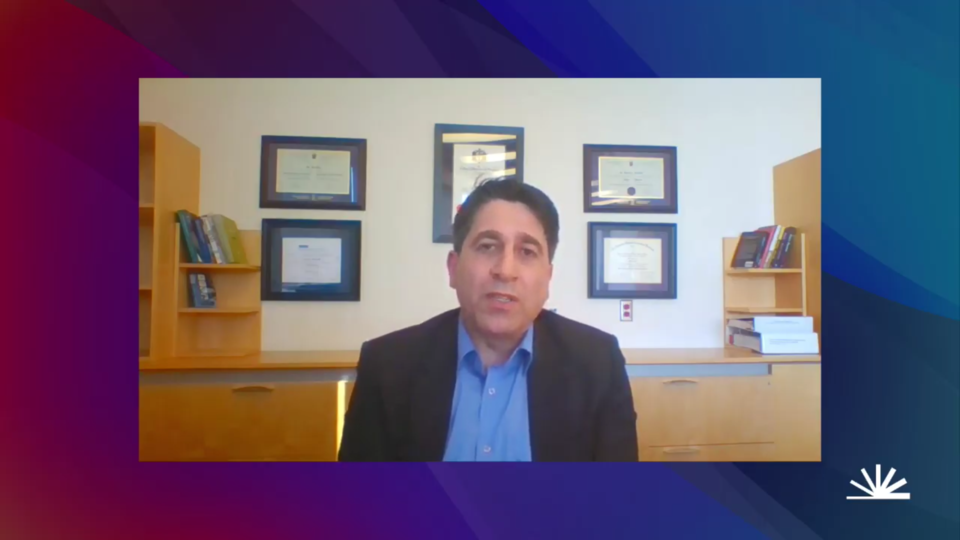The top doc for Grey-Bruce region told Grey County councillors the region's residents have been doing their part to curb COVID, and as a result, the region has fared better than other places in the province.
“If Grey Bruce was an island, there would have not been need for lockdowns,” said Dr. Ian Arra, medical officer of health for Grey Bruce Health Unit. “Everybody's going over and beyond, there is fatigue, but in general the majority of the public are doing the right thing. If Ontario was as engaged and committed as Grey Bruce there would have not been a lockdown.”
Arra gave an update to Grey County council Jan. 13, discussing the new measures that have been implemented in the province following the surge of COVID-19 cases brought on by the spread of the highly transmissible omicron variant.
“The strategy, provincially and locally, has shifted from containment, which was quite successful with the delta variant for a period of months, … to slowing down the progress, since containment is not possible with a variant that has a doubling time of around or less than two days,” Arra said.
The latest situation update released by the health unit on Jan. 14, reported 61 new cases captured by limited testing, and 14 local residents hospitalized.
There have been 19 deaths in the region to date, and there are 11 long-term care/ retirement homes in outbreak plus one hospital (Owen Sound).
“We are focusing on case and contact tracing in high-risk settings, and that's direction from the province, including the hospital sector, the first responders, and long term care and retirement tone and other congregate settings.”
Arra said that a key focus in Grey Bruce is ensuring timely access to third doses of vaccines, which the health unit has made available through community hub vaccination clinics.
“Our mandate is to provide access as soon as possible,” he said. “I am proud to say most health units have a plan of providing the third dose during January, February and March, we have the entire population provided access within two weeks in January.”
With the planned return to in-person learning for Ontario students Jan. 17, Arra stated that school closures will no longer be decided by the health unit.
Schools across the province are expected to be outfitted with improved masks for staff and students, additional COVID-19 tests, and additional HEPA air filtration units prior to the return to school on Monday.
“It was a direction from the ministry not to dismiss cohorts based on cases or outbreaks,” he said. “Rather, if there's any need to close schools, it will be based on capacity of the school itself, and the number of people in isolation who are workers in the school [with] the rough estimate around 30 per cent.”
“The decision from the school management could be to close to school, but it will not be [with] involvement from public health.”
County councillor and Grey Highlands deputy mayor, Aakash Desai, said he has been hearing about increasing COVID fatigue, which has become grating as public health measures continue despite high vaccination rates.
“I think I speak for a lot of people when I say that COVID fatigue has taken over,” he said. “I know a lot of people, especially my age, they're getting to the point where they said, ‘we isolated, we got vaccinated, we got boosted, and we're still here, so what's the point of any of this?”
“I worry that if enough people get to that point of COVID fatigue, then restrictions are impractical, and therefore by extension effective, and that is my worry.”
Arra pointed out that the vaccines are not as effective as they were on previous variants of COVID-19, and that the sheer volume of cases in the province made the current restrictions necessary.
“The significance of the period we're in right now is the sheer number of people, even [the] common cold, if it's going to affect everybody at the same time, it's going to overwhelm the healthcare system,” he said.
County councillor and mayor of Chatsworth, Scott Mackey asked about how to balance essential work with the rampant spread of cases.
“How do we weigh the risk around a shortage of emergency personnel versus the spread of omicron? If response times are delayed then there's certainly a huge risk of fatalities,” Mackey said.
Arra said that there are measures in place to allow essential work to continue in isolation, including exemptions that are being made when safe to do so.
“Two days ago ... a snow plow driver tested positive and there was, with the recent weather events, the need for them to be on the road, and I personally made the exemption for that driver to drive," said Arra. “We have arranged from day one of the pandemic, where physicians or nurses or paramedics work in isolation … we provide the parameters for that work to ensure safety."
Arra also spoke to why testing has become less available to the public in recent weeks, citing the need to focus on high-risk settings.
“If we're heading to [the virus becoming] endemic, and there is no way not to head to it … we don't need to focus on those numbers,” he said. “We need to look at the most meaningful metric at this point, which is … hospital increase, or hospitalization cases, and unfortunately, deaths as well.”



